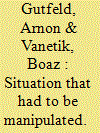| Srl | Item |
| 1 |
ID:
146788


|
|
|
|
|
| Summary/Abstract |
Nobody believed that Israel was in any kind of mortal danger whatever. Hurt, yes; frightened, yes. It was pretty quickly clear that what we had to have out of this war was no unchallenged victor and no humiliated loser, and we all agreed. I don't think anyone in that operation [US State Department Center] could ever believe that we had anything but a situation that had to be manipulated.
|
|
|
|
|
|
|
|
|
|
|
|
|
|
|
|
| 2 |
ID:
102732


|
|
|
|
|
| Publication |
2011.
|
| Summary/Abstract |
We focus on the part that was played by the U.S. Administration, in particular by National Security Advisor Henry Kissinger, in the failure of efforts to bring about an Israeli-Egyptian settlement in 1973, the year in which the Yom Kippur War broke out. Documents recently declassified in the United States and Israel support that the behavior of the White House, especially of Nixon's influential NSA, Kissinger, in the Middle East arena that year not only failed to prevent war but also indeed catalyzed its outbreak. We shall claim that in the examined period Kissinger led a "stalemate policy", which in practice meant undermining any peace initiative that surfaced if it was not in accordance with Israel's position on a possible settlement. With this in mind, the Egyptian government understood that the United States would have no real interest in promoting a peace process, pressuring Israel to withdraw from the Sinai Peninsula and perhaps also from other territories occupied in the Six-Day War. This assessment prompted the Egyptians to abandon diplomacy and (together with Syria) attack Israel in October 1973. They assumed that such a move would get the White House directly involved in the peace process in the Middle East and lead to the return of Egyptian territories occupied by Israel in the Six-Day War.
|
|
|
|
|
|
|
|
|
|
|
|
|
|
|
|